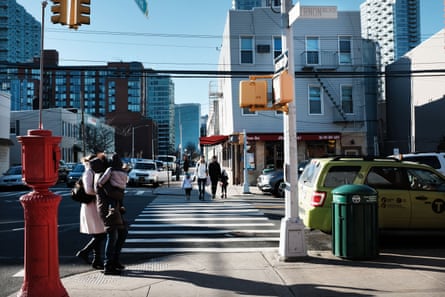Amazon made plenty of enemies with its plans for a new headquarters in New York, but one of those foes played an outsized role in sending the tech giant packing.
The man who stared down Amazon is state senator Michael Gianaris, a Democrat who represents Long Island City, the Queens neighborhood where the company set its sights.
Gianaris came out in opposition to a deal that proposed $3bn in subsidies and tax breaks for the new campus, alongside a slew of other politicians. But his outrage turned into leverage when he was last week appointed to an obscure state board where he would be one of three people with veto power over the project. Days later, reports emerged that Amazon was rethinking its plans.
By Thursday, the company had called the project off.
“New York is in a unique position to stand up and draw a line, because Amazon is not bigger than New York,” Gianaris told the Guardian. “We have the ability to set the tone for the nation.”
If Amazon had had its way, its new campus would have risen on a waterfront parcel across the East River opposite Manhattan. It was to employ at least 25,000 people and, backers said, generate $27bn in tax money for the city and state over the next 25 years.
Grassroots groups organized quickly against the project, which they worried would drive up rents. Amazon executives further angered opponents when they vowed to oppose any effort by workers to unionize.
“A community that was facing its own demolition was salvaged. And New York took a stand against the type of corporate subsidies that are increasing the wealth concentration in this country,” Gianaris said.

New York governor Andrew Cuomo, the project’s chief proponent, has made clear who he will blame for the project’s collapse: his fellow Democrats in the state senate.
“The New York state senate has done tremendous damage,” he said on Thursday. “They should be held accountable for this lost economic opportunity.”
The state senate’s top Republican also took aim. “From the start, the senate Democrats have politicized and poisoned this process just so they could avoid the wrath of the extreme left wing of their party,” minority leader John Flanagan said after the deal’s collapse.
But Gianaris had no problem playing the chief naysayer. “I’m very comfortable being the person that says we should not be giving $3bn to Jeff Bezos when we can’t afford to fix our subways or have enough housing for people to live in,” he said.
The politician fought the project on multiple fronts, holding rallies, gathering petition signatures and introducing bills that would bar New York from participating in nondisclosure agreements (NDAs) like the one used to lure Amazon, and prohibit real estate sales based on inside information.
But his best chance to stop the project came through a little-known panel called the public authorities control board, which had to sign off on a development plan.
Gianaris, who became a deputy majority leader in the senate when Democrats claimed control of the body this year after years of Republican dominance, was chosen as the senate’s representative on the board, a post that comes with veto power. That was a hurdle for Amazon, which had counted on the state’s maneuver to avoid a city council vote.
Amazon picked New York and Arlington, Virginia, for new offices after staging a national competition between cities vying to host its secondary headquarters, after its base in Seattle.
News that the company was wavering on New York set off a new scramble among cities which had lost out but were quick to say they would still welcome the project.

Dallas was eager for another shot, with an editorial in the Dallas Morning News headlined: “Dear Amazon, New York Doesn’t Want You; Dallas Does.” Miami and Chicago renewed their interest, as did Newark, New Jersey, which had offered Amazon $7bn in incentives. Even a Staten Island city councilman made a pitch for the company to simply switch New York city boroughs and avoid the strife.
But Amazon disappointed the other contenders, saying it has no plans to reopen the HQ2 search.
It’s not unusual for big development projects to generate big opposition in New York. A few are killed, but more commonly local officials extract concessions from the developer.
For a company like Amazon, that may have meant giving up some of its subsidies or agreeing to remain neutral if employees attempted to unionize.
But Amazon, which dangled its headquarters as a prize for cities to covet, proved unwilling to deal.
“Rather than engage with the community that would be most affected by their project, they instead decide to pack up and leave like a petulant child,” Gianaris said. “There’s no indication they took seriously the community’s concerns regarding this project.”
Most New Yorkers sided with Amazon, according to opinion polls. A statewide poll by Siena College this week found that 56% of voters support the proposal, even when told it includes $3bn in incentives. Still, the company chose not to dig in for a long fight against its political opponents.
Gianaris, meanwhile, isn’t about to start shopping at Amazon again.
“I was lamenting during the holidays that it was really hard to shop without using Amazon. That’s how pervasive it’s become,” he said. “They’re into everything, and that’s part of the danger of who they are and the kind of power they have.”
